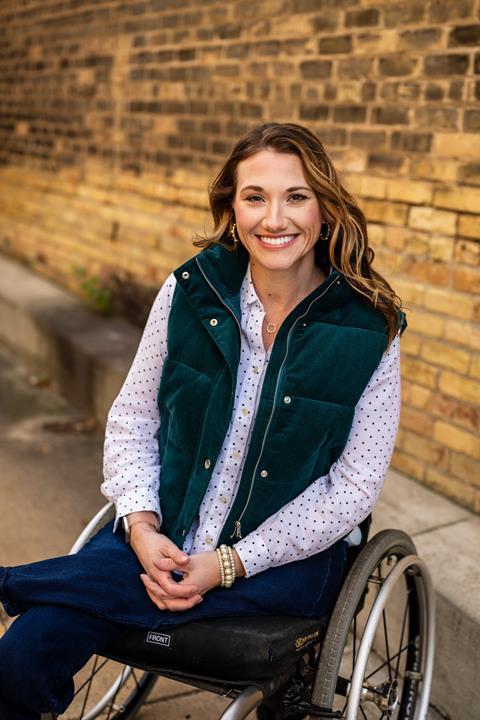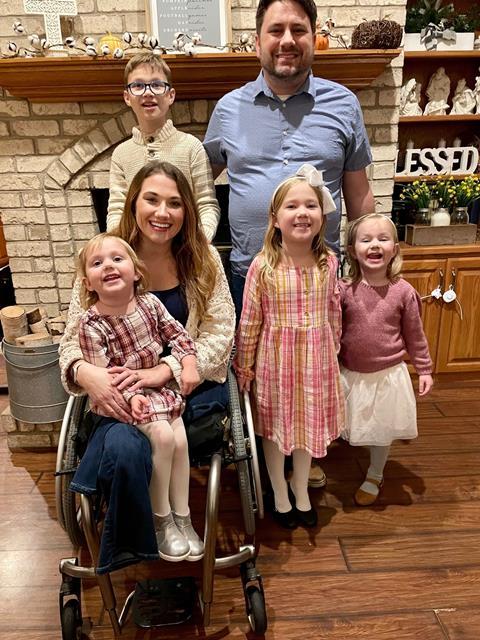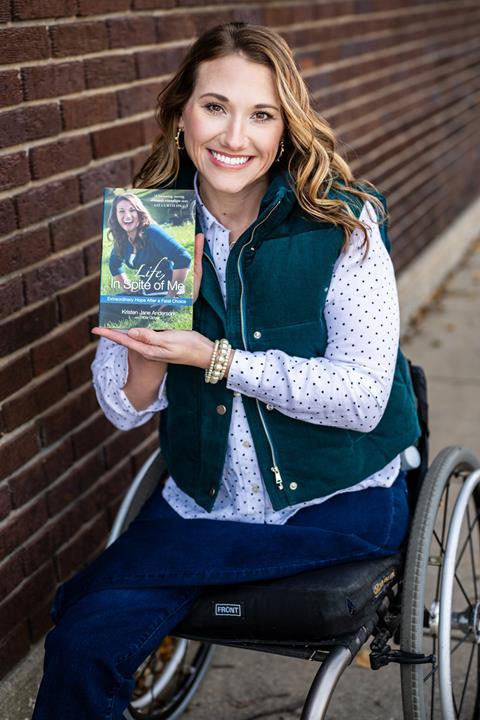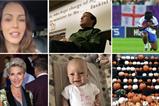Kristen Jane Anderson, 41, tried to kill herself when she was 17. While her life was spared, she lost both of her legs. She spoke to Jemimah Wright about her story, and why she now lives to bring hope to others

Jemimah Wright (JW): Can you start with telling us about your childhood?
Kristen Jane Anderson (KJA): I had a pretty good childhood in Illinois. My parents loved me; I had two siblings. I had everything I needed and most of what I wanted as a kid. But when I got to around eleven/twelve years old, I realised that there were wars going on in the world, that sexual abuse was actually a real thing and that homelessness was an issue, even around the area that I lived.
I became burdened by all of that. I just wanted to make the world a better place. So I started trying to volunteer at our local homeless shelter. I did that for about a year, every Friday night. It felt like the same people came back every week, even kids with their parents. It was really hard.
JW: How did that lead to the event that took place when you were 17?
KJA: I had a lot of friends in high school, I was in the soccer team, my boyfriend was prom king. But in 1998 and 1999 a lot of traumatic things happened. A kid from my school died in a motorcycle accident, another in a car accident, one because of a brain tumour and one because of suicide. My grandmother then passed away and I was raped by a young man who I trusted.
Right before the train got to me, I went and lay my body on the tracks
I started spiralling into depression. My parents knew something was wrong. They took me to see a lot of doctors and counsellors but nobody really ever used the word depression. I thought I just needed to pretend everything was OK.
On New Year’s Eve during my senior year, I was supposed to be going out with my friends. I felt like I was doing the right thing, because I decided not to drink that night. I wasn’t doing anything that my parents wouldn’t want me to do except I called to tell them I wasn’t coming home and hung up before they could respond; that really devastated them. I remember when I came home the next morning, my mom said something like: “Kristen, we didn’t know if you were dead in a ditch somewhere.” I was heartbroken because I wasn’t trying to hurt her.
JW: Why do you think you were acting in that way?
KJA: I was just grasping at anything to live for; anything that made me feel a little bit better. I went to sleep and the next morning my best friend Kelly called. She wanted me to go over to her house. I knew I wasn’t supposed to be going anywhere because my parents had told me I was grounded until further notice.
I dishonestly wrote a note to my parents saying that I was going for a walk because I knew I wouldn’t get in trouble for doing that. I went to Kelly’s house for about three hours, then another friend dropped me off near my home. I walked to the park that was across the street from my parent’s house. I decided to just swing on the swings until I was ready to go home.
I began to contrast happy, joyful childhood memories with how I was feeling as a teenager – broken, disillusioned, empty, lost, and confused. I felt like no matter what I did, I couldn’t go back. I couldn’t go forward either; I felt like I was just going in circles.
It wasn’t even 6pm yet, but it was starting to get dark, and I knew if the police saw me on their patrol they would tell me to go home. But I didn’t want to go home yet. I just wanted a little more time.
My house was just by the train line, and I saw there was a train that had been parked on one of the unused tracks for a while. I figured it wasn’t going anywhere so I decided to walk over and sit on it.
I was suddenly reminded of my friend Brandon’s suicide. I remember thinking: “How could he ever do that? I could never do that, especially the way that he did it.” It just seemed so morbid and dark and hopeless. But then my thought process started to change, to: “Well, even though I would never do it, if I would, how would I do it?”
All of a sudden, a train went past my parent’s house on another track, and a thought popped into my mind: “If I put my body on the tracks I would never live through getting run over by a train.’ It was a completely hypothetical thought process.
JW: What happened next?
KJA: For about an hour and a half I sat with conflicting thoughts until another train started to come. I knew I needed to make some sort of a decision so right before the train arrived, I went and lay my body on the tracks. I closed my eyes and clenched my fists, turning my head in the opposite direction to where the train was coming from. I tried to push down the fear and shame that I felt, because I knew this wasn’t the right choice. I just didn’t know what the right choice was.
It was only a split second before the train started to go over me. When it did, I felt pain, but it was more in the background. What I felt was the rush of the wind. I felt my hair and my head, my shoulders and the midsection of my body start to rise up towards the bottom of the train. And then very quickly afterwards, I felt something push me down and hold me firmly.
It says in the police report that I was run over by 33 freight train cars travelling at 55 miles per hour. And that the conductor said to the engineer: “Did you see that yellow flash?” The engineer replied: “Yes. I think we just hit someone.” So they called 911.
I looked behind me to my right and saw my legs about ten feet behind. I knew that they were my legs because they had these bright white tennis shoes on them that I got for Christmas.
The paramedics said when I got to hospital that I had lost eight pints of blood, because my femoral artery was cut. They said I should have bled out. Scientifically I should have been dead. It’s a miracle that I survived.
I woke up the next day in intensive care and the doctor told me that my left leg was severed well above the knee, my right leg was severed directly below the knee, but that I might be able to walk with the use of prosthetic legs one day.
JW: What did you feel at that point?
KJA: One of the things people told me over and over again was: “Kristen, God kept you here for a reason. There’s something you’re supposed to do here.” As a 17-year-old girl who had just lost her legs, I thought: “Why would God keep me here without my legs?” It seemed cruel at first.
I eventually got out of the hospital just for a weekend. And that weekend, we went to church. A woman came up to me and told me I would have gone to hell if I died. She didn’t know me; she just knew what I did. I don’t recommend saying that to anybody, but it really sent me searching.
Not long after, a couple came to have dinner with our family. I boldly asked the husband, who was in seminary, if he thought I would have gone to heaven or hell if I had died. With all the love in the world he just shared the gospel with me. I felt like what he was telling me was more true than anything I’d ever heard in my life before. I asked him to show it to me in the Bible. The verse that stood out to me the most was John 14:6, where Jesus says: “I am the way and the truth and the life. No one comes to the Father except through me.”
I knew this wasn’t the right choice. I just didn’t know what the right choice was
I realised that I had never accepted Jesus personally, in my heart and into my life. So that night, sitting on the floor of the dining room, I prayed this simple little prayer asking God to forgive me for everything I had ever done wrong and asking him to give me a new life.
I asked him to forgive me for trying to take my own life. I realised that night that my life wasn’t mine to take – that God alone gives and takes life. As I went to sleep, I felt different, like a weight had been lifted off my shoulders and, one way or another, I was going to be OK.
JW: How did things change from that point?
KJA: It took about a year for my body and my arms to adjust to pushing myself around in a wheelchair. I started to drive again about six months after I lost my legs. That helped me become more independent again as I got a car equipped with hand controls, and I could move on with my life much like anyone else.
But emotionally I was floundering until my counsellor helped me realise that even though I had accepted God’s forgiveness, I had not forgiven myself. She had me memorise Romans 8:1 which says, “Therefore, there is now no condemnation for those who are in Christ Jesus,”. The more I would say that verse to myself, the more it sank deeper into my heart and soul.
I found so much freedom as I started to forgive myself. And that’s when I was able to get off of all the medications that my doctors told me I’d have to take for the rest of my life, including my pain medications. I was able to quit smoking and drinking and started going to church where I got involved with a young adults group. I was reading my Bible and met a bunch of friends my age, who were seeking the Lord and living for him. I realised that God wanted to have a real, close relationship with me.
I was asked to share my story with the high school students at our church and things just took off from there. I was 21 at this point. Every time I shared more and more lives were changed.

JW: You are now married with children – can you tell us that story?
KJA: I started an organisation called Reaching You in December of 2004 after I had been asked to share my story at different churches or youth groups, and many people had been reaching out to me for help and encouragement. Some friends from church and my parent’s small group helped get the non-profit started, and then a few years later Alan began volunteering with the ministry. I was going to Moody Bible Institute, and he had just finished a two-year pastoral programme and was looking for a non-profit to do an internship with. It was his servant’s heart that attracted me to him. We got married in 2011, and then we had our first child in 2012. Grayson just turned eleven, Adeline is seven, Evelyn six and Lillian is four. We have a big family, actually, as my husband had two children when we got married, so now we have six.
JW: How do you find parenting in a wheelchair?
I looked behind me to my right and saw my legs about ten feet behind
KJA: Thankfully, I had been in a wheelchair for so long before I started having kids I knew what I could and couldn’t do. My husband’s always been wonderful. There’s not a lot I can’t do unless we go on gravel, grass or stairs. Before I married, I always felt like part of God’s big plan for me was to be a wife and a mother. But I knew I wasn’t ready yet so I asked him: “OK, what else? What else did you put me here to do?” And that’s when I felt him call me into ministry for people who struggle with suicidal thoughts and depression. That is what I am dedicating my life to, so that no one else will go through what I did. Everybody needs to know there is always hope.
Find out more about Kristen’s ministry at reachingyou.org

Kristen’s book Life, in Spite of Me: Extraordinary hope after a fatal choice is available now.

































1 Reader's comment